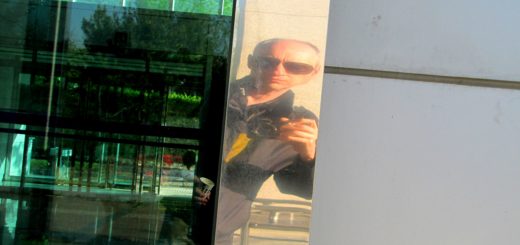The Self-Government Machine
How much of the challenge of political philosophy is rooted in deficiencies of available language? How many essential truths have failed to reach the ears they needed to reach at the critical moment, merely because the individuals who saw those truths lacked universally familiar points of reference with which to communicate their lightning bolts with sufficient precision, or at least with the shattering clarity needed to burst in upon the presupposition-encrusted minds of their contemporaries?
Tocqueville’s warning about the internal threats to the modern democracy he admired, as well as Nietzsche’s criticism of that same democracy, which he despised, were hampered, from the point of view of communicability, by those two great writers’ insurmountable problem, namely a lack of the proper analogy through which to communicate their ideas to a world entrenched in comforting and thought-diminishing presuppositions. Thankfully, or rather lamentably, democracy itself has, through its very boons, furnished us at last with exactly the analogy Tocqueville and Nietzsche lacked, one that, in its way, lays waste to much of our modern fantasy of freedom. For today we may say, with sad firmness, what modern democracy is, which in turn reveals its inherent contradiction: We have invented a self-government machine, which like many other modern technological wonders, has so hypnotized us with its conveniences that we have lost, or rather neglected to learn, the skills that men needed in order to govern themselves before the invention of this effort-saving wonder.
Our modern historicists and cultural relativists routinely mistake the observable similarities between the ideas of the great thinkers and the general language of those thinkers’ respective societies as evidence that the thinkers were mere products or expressions of their societies. They fall into this error because they suffer the standard theoretical deficiency of most modernism — whether regarding knowledge, art, or politics — namely a fatal naïveté about the nature and sources of language.
This naïveté, leading to one of history’s most tragic examples of throwing out the baby with the bath, may be seen right at the birth of the modern enterprise, which was also its intellectual peak. Both Hobbes and Locke, universally acknowledged as essential figures in the development of modern political thought, were also important and influential language theorists. And in this latter capacity, both pursued their desire for a more scientific philosophy, and a corresponding complete rejection of (what they saw as) the baseless and deceptive conceits of their ancient and medieval predecessors, by making the call for literalness the core of their respective theories of language. For all the substantial differences between their views of the subject in general — Hobbes’ materialistic argument that words themselves are the mind’s indispensable placeholders of truth (his “nominalism”) versus Locke’s claim that words are mere useful names for ideas formed in the mind pre-linguistically — the two men agree completely on one issue in particular: They both abhor metaphors, and in general figurative speech, as intrinsically false, even deceptive, and therefore inimical to the rational search for truth.
Right there, poured into the foundations of modernity, and particularly of modern social and political thought, is a naïve absurdity masquerading as scientific rigidity. The demand that philosophic logic, i.e., the purest rationality, eschew all figurative language in favor of strict literalness, demonstrates an oversight of speculative reason so profound that it could only have issued from truly exalted minds. That is to say, only philosophers obsessed with a brilliant new perspective on rationality, a comprehensive new vision of scientific reasoning, could possibly study the development of language itself, and specifically the development of language as a means of communicating ideas, without ever acknowledging the sense in which all language is figurative.
To think beyond the intellectual presumptions of one’s age is necessarily to think beyond its language conventions. One of the seminal problems encoded in the genetic makeup of philosophy itself is the question of how a man who sees what others cannot see could ever communicate his vision in the accepted lexicon of his time, since that lexicon is by definition and necessity limited to the common (i.e., shared) meaning palette of his language group, aka society. After all, a common language is essentially a means of communicating commonly accepted meanings. There is literally no way to say anything in a common language that steps beyond that language’s established range of thought.
The solution — and the key to the historical flux of civilization, as directed, quietly, by the sages — is that the received vocabulary, the catalogue of shared meanings, must be employed figuratively, juxtaposed in certainty-stretching ways to produce a slight tear in the social-intellectual fabric, thereby exposing the world of common opinion to the light of new understanding. It is this bit of communicative magic, then — the chief practical means of intellectual contact between the greatest thinkers and common humanity — that Hobbes and Locke were dismissing as mere falsehood and deception when they consigned metaphorical language to the disreputable category both men labelled “abuses of speech.”
By dispensing with the classical wisdom of philosophical metaphor and other figurative speech, and dispensing with it as a principle of philosophical morality no less — condemning figurative speech as dissembling and illusory — the giants of early modernity paved the way for their own project’s descent into the incoherence of today’s post-Hegelian relativists and historicists, and especially these sophists’ easy dismissal of even the greatest earlier philosophers as mere distillations or mineral deposits of their respective societies — as though philosophic reasoning were as tied to accidents of birth and location as men’s tastes in clothing or snacks. Having banned figurative speech from the arsenal of philosophic investigation, modernity lost the intuitive understanding of language development that allowed the classical thinkers to communicate with their contemporaries without simultaneously diminishing or forsaking their highest and most ahistorical insights. And without this intuition, we moderns are left with no explanation for the surface resemblances between the most divine thought and the best conventional writing but that the divine messengers themselves were mere effluences or vessels of historical trends and linguistic conventions. By failing to recognize the essentially figurative motor of language development, we mistake similarities of vocabulary with similarities of meaning, whereas it is precisely at those points where the key terms of the philosophers most resemble the common language that one ought to be alert to the presence of the most profound differences between the thinkers and their societies at large.
In fact, it is primarily through metaphor and other tropes that the rarest and least convention-bound wisdom will be communicated and have its transformative effect, for the self-evident but therefore easily overlooked reason that there is no other form in which it could be communicated.
The great challenge for the man with insight from beyond his time, then — the kind of thinker whom Nietzsche, referring to himself, dubbed the posthumous man — is to find tropes that, while being superficially comprehensible within the common language, are somehow also able to carry his uncommon meaning in such a way as to break through the barriers of literal sense and conventional thought, thereby to produce the small eruption in the souls of sensitive readers or listeners that the most essential language is intended to produce, and must produce. If the common speech has not yet developed suitable terms for such use in a given context, then the posthumous man must settle for the best of what is available, perhaps always frustratingly aware that his meaning will not likely reach his hearers as forcefully as he would like, due to a simple lack of the perfect metaphor. A posthumous man, qua writer, might be precisely this: the man who only finds his ideal trope in a linguistic future that remained maddeningly unreachable to him during his life.
The electronic calculator was perhaps the most conspicuous harbinger of our technology-mad age’s soul-slackening dependence on automated, externalized rationality. Everyone knew, but quickly learned not to mind, that thanks to this brilliantly efficient convenience, future generations would never master the skill of performing simple arithmetic in their heads as their far less formally educated ancestors had always done. The practical benefits, the tantalizing possibilities of The New, just seemed to outweigh the obvious and world-historical dangers, as though old-fashioned mathematical facility were a mere schoolroom nuisance that might easily be expunged from the process of intellectual development without costing us anything beyond the ten dollar price of a simple electronic device.
Today, we are multiplying and magnifying this externalization of the mind on every front, and at exponential rates of progress. Elon Musk, our Edison of the intellectually impoverished, waxes poetical (or perhaps it is just a drug high) about a day he foresees in which all the accumulated knowledge of the world will be in everyone’s head — not in the mind, mind you, but merely in the physical head — in the form of a microchip wired to the brain.
Digital translation has reached a level of sophistication that has people, including many of my Korean students (who have been studying a second language most of their lives) dreaming about a future when all the trouble of learning other languages will be unnecessary; computer programs will allow us to communicate with people in any language through digital translation, almost instantaneously. Point out the obvious, namely that this will mean losing the mental dexterity involved in learning languages, studying alternative grammar systems, and all the thrill of discovery that comes from overcoming a hurdle to human contact through one’s own mental effort — not to mention losing all the subtleties of regional thought and intonation that can never be directly translated — and you will be met with, at best, a moment of wistful silence. “But wouldn’t it be wonderful to be able to communicate effortlessly in fifty languages, tomorrow?”
The trend in all of this is toward the divesting of all private, i.e., personal, learning and self-development, in favor of the accelerating convenience of automated life and the pain-free overcoming of all the practical and intellectual obstacles that were once recognized as essential stepping stones to self-knowledge and wisdom.
“However,” one might object, “is this not simply the trajectory of all technical enhancements? Does not the development of any knew device or machine, from wheels and utensils on down, entail the gradual loss of some previous skill that is no longer required thanks to the new invention?”
Of course it does. But all losses are not created equal. Learning to write with a pencil on paper means never having to learn how to scratch words into a wax tablet, but it would be very hard to find anything in this difference that is harmful to mental or spiritual development. By contrast, to take our previous example, losing the ability to do arithmetic in one’s head entails a failure to develop our rational faculty, and specifically our logical impulses, through nature’s most universally apparent and undeniable form of rational certainty, numerical relations. Mathematics, which the Pythagorean school regarded as the essence of all existence, from the birth of worlds to the organization of society, and which the Platonists conceived of as a sort of matrix through which the eternal Ideas of all being radiate down to human understanding and perception as the plurality of nature that we experience, is reduced to nothing but a practical nuisance better left to the greater accuracy of machine calculation. To imagine that nothing important is lost in this exchange, as long as we can always work out the answers with a calculator, is analogous to claiming that if a child were equipped from birth with transportation machines and teams of need-fulfilling servants, such that self-movement were never required of him, he would lose nothing of significance as a result of never learning to stand and walk on his own two feet.
In sum, whatever can be done for you artificially is a disincentive to learning to do it for yourself naturally. And if the disincentivized activity is one that is closely related, or even indispensable, to the development of moral character, intellectual acuity, or spiritual independence, then the benefits of the artificial machinery are being purchased at the price of an actualized human being. The “beneficiaries” of such advances are, to the degree that the technology obviates a natural developmental need, moving that much further from human life in the full sense, and that much closer to existence as automatons. The technology-obsessed fantasist’s dream of a future melding of human and machine will be achieved in exactly this way, namely entirely to the advantage of the machine — and of the mechanisms of “society” — and to the long-term detriment of the human.
All of which brings us back to the analogy that lays open the danger hidden in our modern democratic faith, the figure that Tocqueville and Nietzsche were groping after in their struggle to define for us the almost inexpressible core of the modern political problem, but for which mankind’s common lexicon had not yet developed the necessary name. Modern man, driven by his enlightenment, his faith in equality, and his yearning for a universal happiness defined as material comfort, has invented a self-government machine to ease the burden of liberty on the individual. Through many generations of increasing reliance on this machine, men have lost both the natural impetus and the learned skills of freedom.
Let us engage in a moment of speculation in the spirit of modern political philosophy’s seminal achievement, “state of nature” theory, beginning with the modern political assumption, namely that the state’s existence is, in theory, a product of the individual’s natural inclinations.
Individuals come together to produce families by natural impulse. The family is nature’s community, conceived by the innate desire for what we, as animals, assume is mere pleasure, and fully born of the couple’s sublimation or education of that desire through the more spiritual affection bred of intimacy and mutual concern for their offspring. The practical necessities of producing and caring for children, however, demand developments of long-term reasoning for the sake of efficient sustenance and protection against both immediate dangers and future contingencies, i.e., preservation and security.
Inevitably, a number of such families living within an area confined by environmental features or available resources will come into contact with one another — perhaps violently at first, due to natural protectiveness and ignorance, but gradually with increasing empathy and a recognition of the potential mutual benefits (including increased security against hostile interlopers) entailed by joint effort and peaceful coexistence. The families begin to see one another not as mutual threats, but as mutual buffers against the daily hardships of survival, and then as partners and companions in the increasing comforts of bounty. Shared interests and needs, and the awareness of tangible life-enhancements from coordinated action, foster a measure of goodwill among the families in general, and in specific cases friendships. A true community has been formed.
As the number of families within the community grows, and their interactions with regard to shared responsibilities and exchanges of goods and property become more complex, there is felt an increasing need for a system of mutually agreed-upon rules of conduct that will be somewhat objective in character, and applicable in a manner that is perceived by all as both fair and realistically enforceable, for the well-being of the community as a joint endeavor. A simple justice system is born. And the growing community, eventually comprised of more families than can truly be intimate with one another, and producing larger stocks of food and other goods, will also have a greater concern for mutual protection against isolated bandits or even other whole communities. Arrangements are made among the citizens for the common defense, and a system of warnings and methods of calling men to arms on a moment’s notice is settled upon. The community now has the rudiments of what we would call a government.
It is worth observing here, however, that although we no longer experience it this way today, the truth of the matter is that what we now call government is actually nothing but an artificial extension of the natural government intrinsic to every human, which is to say his self-government. The abstracted, inhuman but vaguely personified entity you and I designate with the name “government” is in reality a manmade outgrowth of the needs and imperatives of natural self-determination. Its generation and purpose are entirely rooted in the concerns, passions, and reasoning of self-governing individuals who, in calculating the best means to their own preservation and prosperity, determine, as a matter of techne, that an externalized, collective mechanism which embeds the intentions of individual self-rule into the community’s very structure will best promote long-term wellbeing. In other words, modern popular government is at its foundations a self-government machine, an artificial product designed to perform a natural and necessary function in a more efficient way.
Nevertheless, this externalized or communal government — self-government mechanized — in its logically original form, is naturally limited in its role and scope. As such, it may be clearly experienced by all citizens as a product of their own individual wishes and choices. And it has minimal direct impact on most of the positive activities and deliberations of human life. The real life of the community is found largely apart from the workings of formal justice and common defense, which latter functions are invested in the (externalized) government primarily to support and ensure the maintenance of that life. That is to say, the community exists primarily in the personal relationships between families, and secondarily between neighborhoods. “Society,” in this founding stage of political life, has almost nothing to do with the workings of government or the relationship between citizens and state; it has almost everything to do with the schoolrooms and churches that groups of families build together for their mutual benefit, the long evening chats among neighborhood old folks on the veranda, the local shops where everyone knows the proprietors by name, the spontaneous gifts (not charity) of homemade food delivered to the man around the corner who just lost his job, or whose wife is in the hospital. In sum, the rational self-interest and mutual benefits of living together with others, which led to the creation of the community, and then to the establishment of a government system — which, once again, is merely a universalization of certain functions of natural self-government with a view to greater efficacy — continue to be the presiding tenor of community life beyond the narrow realm of that government system. In other words, within the souls of men, natural self-government remains the rule, while in the community as a whole, it serves as the standard. Natural freedom generates an essentially artificial, but naturally-grounded, system of ordered liberty.
As the community grows in population and prosperity, however, it reaches a size and a level of ease at which personal interaction, let alone familiarity and attachment, among the general citizenry, becomes impossible. Lack of engagement leads to lack of practical interest or emotional investment. Increasingly, men interact with their fellow citizens, who are now mostly strangers, almost exclusively through the mechanisms of state, rather than beyond them, as this is just easier and less demanding. The boons of well-ordered liberty bring comforts that seem impossible without the self-government machine, so much so that these comforts themselves gradually come to feel like the very purpose of the machine.
Comfort, ease, luxury — and the detachment from the natural struggles of human life that these boons necessarily engender — gradually re-isolate the individuals. The assurances and protections made possible through the superimposition of government onto the community gradually separate men from each other by disincentivizing the naturally-grounded inclinations of active mutual support and goodwill that originally produced the government, just as the electronic calculator gradually disincentivized the development of numeracy. This time, however, man’s isolation, rather than cultivating self-reliance, self-determination, and resilience — as isolation does in the state of nature — is artificially protected and secured within the cocoon of the state. Hence, for the artificially-isolated man, dependence on the effort- and risk-saving conveniences of the self-government machine itself becomes a deeply entrenched habit of the soul, an elaborate means of hiding, in effect the drug dependency or alcoholism of civic life.
Hiding from what? From the imperatives, fears, suffering, and challenges of life as a self-governing individual, all of which modern men have lost the taste for, after generations of increasing reliance on the machine they invented to perform some of the most ennobling tasks for them at arm’s length, i.e., to spare them some of the pain of natural self-development. The externalized rule of the self-government machine allows men to focus almost exclusively on the pleasures of living “happily,” rather than on the struggles of living. Comfort and luxury breed idleness, weakness, and therefore a growing desire among men to divest themselves of (i.e., to externalize) more of the demands — including the emotional demands — of natural self-reliance, by programming these too into the workings of the self-government machine, which in turn comes to be perceived ever more indispensably as humanity’s all-purpose pain relief system, where “pain” now typically means exactly what it means to a spoiled child: responsibility.
Consider the simple example of government-coerced charity, i.e., “redistributive justice,” which advocates of liberty since St. Thomas Aquinas have argued would inevitably devalue and finally dissolve the dispositions of the soul that make individuals liberal or charitable, thereby substituting state-regulated “good outcomes” for nature’s incentivization of private moral feeling and personal responsibility. Modern men, as St. Thomas predicted, can now feel good about themselves in the abstract while being absolutely and viciously self-absorbed and childish in their concrete lives, i.e., as individuals. “The government should take care of that” — the sentiment of a perfectly infantilized slave — has effectively become the moralizing motto of late modern man in all matters of adult concern.
Modern liberty, through its own workings, has gradually stunted the development of the very state of (human) nature that gave rise to it. As a result of this slow process of comfort-induced self-diminution, humans no longer intuitively understand their government as it logically was, namely nothing but a mere extension of their own private wills, but are rather more likely to perceive themselves as nothing but mere extensions of the will of government. The relationship between modern scientific man and his most ingenious and definitive invention has reversed itself. The State, in late modernity, is no longer a self-government machine at all. On the contrary, late modern man is now a mere instrument and byproduct of the State.
Tocqueville’s “soft despotism” and Nietzsche’s “last man” were those two great posthumous men’s respective attempts to warn their contemporaries, or perhaps their posterity, of the dangers inherent in modernity’s proudest and noblest political idea, the self-government machine.



